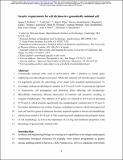Genetic requirements for cell division in a genomically minimal cell
Author(s)
Pelletier, James F; Sun, Lijie; Wise, Kim S; Assad-Garcia, Nacyra; Karas, Bogumil J; Deerinck, Thomas J; Ellisman, Mark H; Mershin, Andreas; Gershenfeld, Neil; Chuang, Ray-Yuan; Glass, John I; Strychalski, Elizabeth A; ... Show more Show less
DownloadSubmitted version (13.67Mb)
Publisher with Creative Commons License
Publisher with Creative Commons License
Creative Commons Attribution
Terms of use
Metadata
Show full item recordAbstract
Genomically minimal cells, such as JCVI-syn3.0, offer a platform to clarify genes underlying core physiological processes. Although this minimal cell includes genes essential for population growth, the physiology of its single cells remained uncharacterized. To investigate striking morphological variation in JCVI-syn3.0 cells, we present an approach to characterize cell propagation and determine genes affecting cell morphology. Microfluidic chemostats allowed observation of intrinsic cell dynamics that result in irregular morphologies. A genome with 19 genes not retained in JCVI-syn3.0 generated JCVI-syn3A, which presents morphology similar to that of JCVI-syn1.0. We further identified seven of these 19 genes, including two known cell division genes, ftsZ and sepF, a hydrolase of unknown substrate, and four genes that encode membrane-associated proteins of unknown function, which are required together to restore a phenotype similar to that of JCVI-syn1.0. This result emphasizes the polygenic nature of cell division and morphology in a genomically minimal cell.
Date issued
2021Department
Program in Media Arts and Sciences (Massachusetts Institute of Technology)Journal
Cell
Publisher
Elsevier BV
Citation
Pelletier, James F, Sun, Lijie, Wise, Kim S, Assad-Garcia, Nacyra, Karas, Bogumil J et al. 2021. "Genetic requirements for cell division in a genomically minimal cell." Cell, 184 (9).
Version: Original manuscript